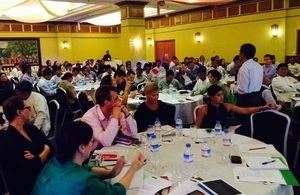Fuelling social investment in Burma
On 27-28 January the British Embassy supported a workshop organised by the MCRB on 'Social Investment in the Extractive Industries'.

Workshop on 'Social Investment in the Extractive Industries
Bringing together local and international oil and gas companies, civil society organisations, and government officials, the workshop sought to develop discussions about the kind of social investments that will sustainably meet local community needs.
Speaking at the opening of the workshop, the British Embassy’s Deputy Head of Mission Matthew Hedges said:
As the fastest growing economy in Southeast Asia, this is a country of huge potential but which also faces significant challenges. With unemployment at around 35% and a quarter of the population living below the poverty line responsible investment by international business has a major role to play in alleviating poverty; improving livelihoods and helping transform the Burmese economy.
The UK Government and private sector is committed to supporting the reform process. We believe that a transparent and rules-based economy is essential for growth and poverty reduction. This is why, during the UK’s G8 Presidency in 2013, we supported calls from President U Thein Sein’s Government to ensure there was a commitment to responsible business here.
As one of the main donor countries, we have been matching our words with deeds. We are working with Government, Parliament, business, civil society and international organisations to help build an economy which generates strong, sustainable, balanced growth that builds prosperity and reduces poverty.
The UK is working to support efforts to ensure that the population as a whole benefits from its abundant natural resources. The UK supported the country’s EITI application, and we will continue to assist with the implementation, as well as the related capacity building and frameworks. We are working with local and regional networks on workshops to showcase the benefits of multi-stakeholder engagement, conflict sensitive economic governance, tackling corruption and the adoption of international standards on transparency. We are also involved in work to protect and manage Burma’s vast forest reserves.
UK businesses, including oil and gas companies who are now entering the country, place great importance on obtaining and retaining their social licence to operate. They are keen to engage with local communities to ensure that they can make a telling, positive contribution through their presence.
We continue to share, with Burma’s public and private sectors, the UK’s experience of developing our own UK Action Plan to implement the UN Guiding Principles on Business and Human Rights - we would urge the government here to adopt one too. As 2014 Chair of the Voluntary Principles, we urge companies to take up the VPs, to avoid future conflict scenarios, such as the situation we now see in Letpadaung.
When I refer to ‘conflict’ I do not merely refer to armed conflict, though that is sadly one element here. I also refer to policy conflicts, conflict of economic interests, inter-community issues, and social issues such as land rights and access to services and economic opportunity.
Workshops like this one should aim to help mediate new relations between communities, civil society organizations, business and State actors during a period of transition - to create shared values. Collective ongoing commitment from all sides is of paramount importance. It is not just encouraging economic growth and fixing percentages for social investment spending that is important. What is paramount is an understanding that the way in which we encourage this growth and plan the social activities that come with it, will have a lasting impact, and that this impact needs to be maximised for all concerned.
The fact that you are all gathered here today is a clear sign of progress, and your commitment to these issues. But the challenge remains. How can we sustain this and ensure that investment and development works for the country as a whole?
Further information
The workshop was featured on MITV
The Myanmar Centre for Responsible Business: MCRB